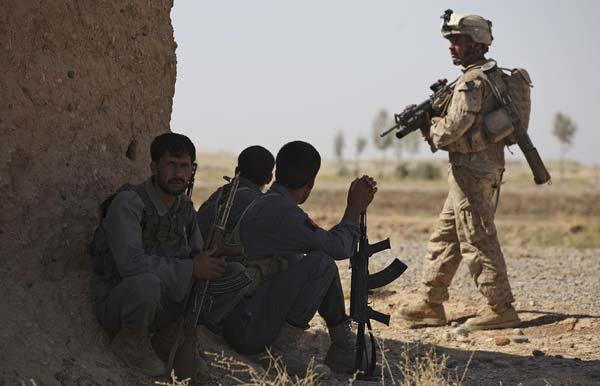WASHINGTON — As the White House began Tuesday to debate in earnest the Afghanistan war, NATO's secretary general said President Barack Obama is right to delay troop decisions until a possibly revamped approach is devised.
"The first thing is not numbers," Anders Fogh Rasmussen, chief of the North Atlantic Treaty Organization, told reporters as he and Obama wrapped up their Oval Office meeting.
Still, Fogh Rasmussen said U.S. and allied troops will remain in Afghanistan "as long as it takes."
The two leaders did not take questions. Obama is deciding whether to shift course in Afghanistan. The choice is between ramping up military strength there to try to prevent the Taliban and other extremists from again making the nation a haven for terrorists or turning to a new strategy of focusing mostly on rooting out al-Qaida elements growing stronger in neighboring Pakistan. The latter option would involve mostly unmanned spy planes and special-forces units.
Among the recent developments that have scrambled the administration's thinking are the Aug. 20 elections in Afghanistan, afflicted by claims of ballot stuffing and voter coercion.
The president meets today at the White House with Defense Secretary Robert Gates;Secretary of State Hillary Rodham Clinton; Joint Chiefs Chairman Adm. Mike Mullen; national security adviser James Jones; Obama's special envoy for the region, Richard Holbrooke; and others. Those high-level players were meeting without Obama on Tuesday to prepare for today's discussion.
The top U.S. commander in Afghanistan, Gen. Stanley McChrystal, and his boss, U.S. Central Commander Gen. David Petraeus, also were taking part in both meetings, either by secure video conference or in person. Today will be Obama's first discussion with his Afghanistan commander since June.
McChrystal recently delivered his on-the-ground assessment of the war and needed changes, including a call for more combat troops. His specific troop request is contained in a separate document, and Sen. John McCain of Arizona, top Republican on the Senate Armed Services Committee, said that both Petraeus and Mullen support it.
White House press secretary Robert Gibbs called this week's deliberations "the beginning of a process" and said Obama's final decision is "a number of weeks away." He said Obama's advisers are not yet even at the stage of offering him options to consider.
"We're going to go through the McChrystal assessment and go through additional ideas and go from there," he said. "This isn't going to be finished in one meeting."
Interactive
Gibbs said McChrystal's resource request won't even be forwarded to the White House until Gates and Obama feel a consensus has been reached on how to move forward strategically.
McChrystal is widely believed to be asking for as many as 40,000 additional troops, and Mullen said in Senate testimony this month that more forces probably will be required to win the war.
Obama didn't mention McChrystal or any specifics about his Afghanistan dilemma when he appeared with Fogh Rasmussen. But the NATO leader said European allies are examining McChrystal's assessment, while understanding that Obama and others have an obligation to think about more than just that.
"I agree with President Obama in his approach: strategy first, then resources," he said. "And don't make any mistake: The normal discussion on the right approach should not be misinterpreted as lack of resolve." Information for this article was contributed by Lara Jakes, Slobodan Lekic, Lori Hinnant and Noor Khan of The Associated Press.
Front Section, Pages 4 on 09/30/2009

